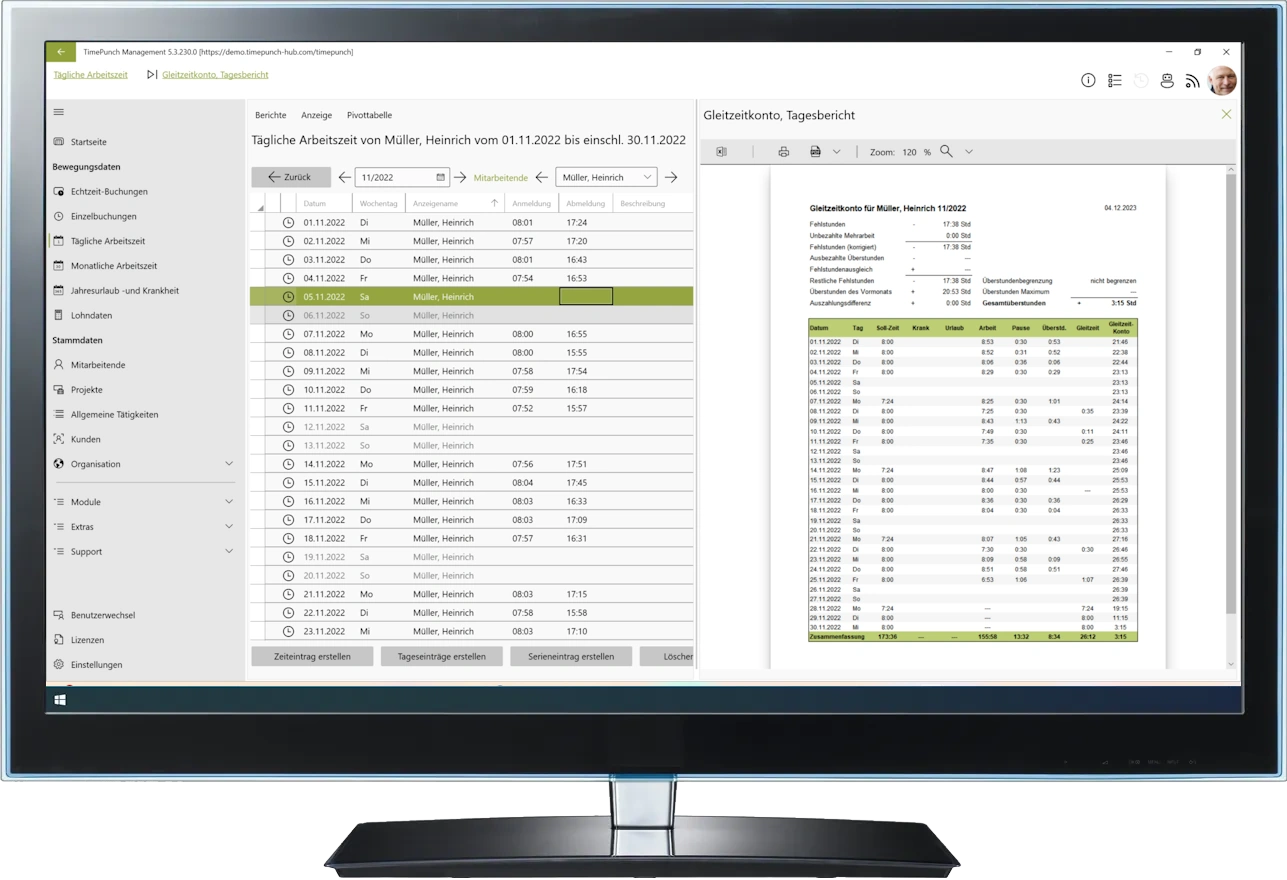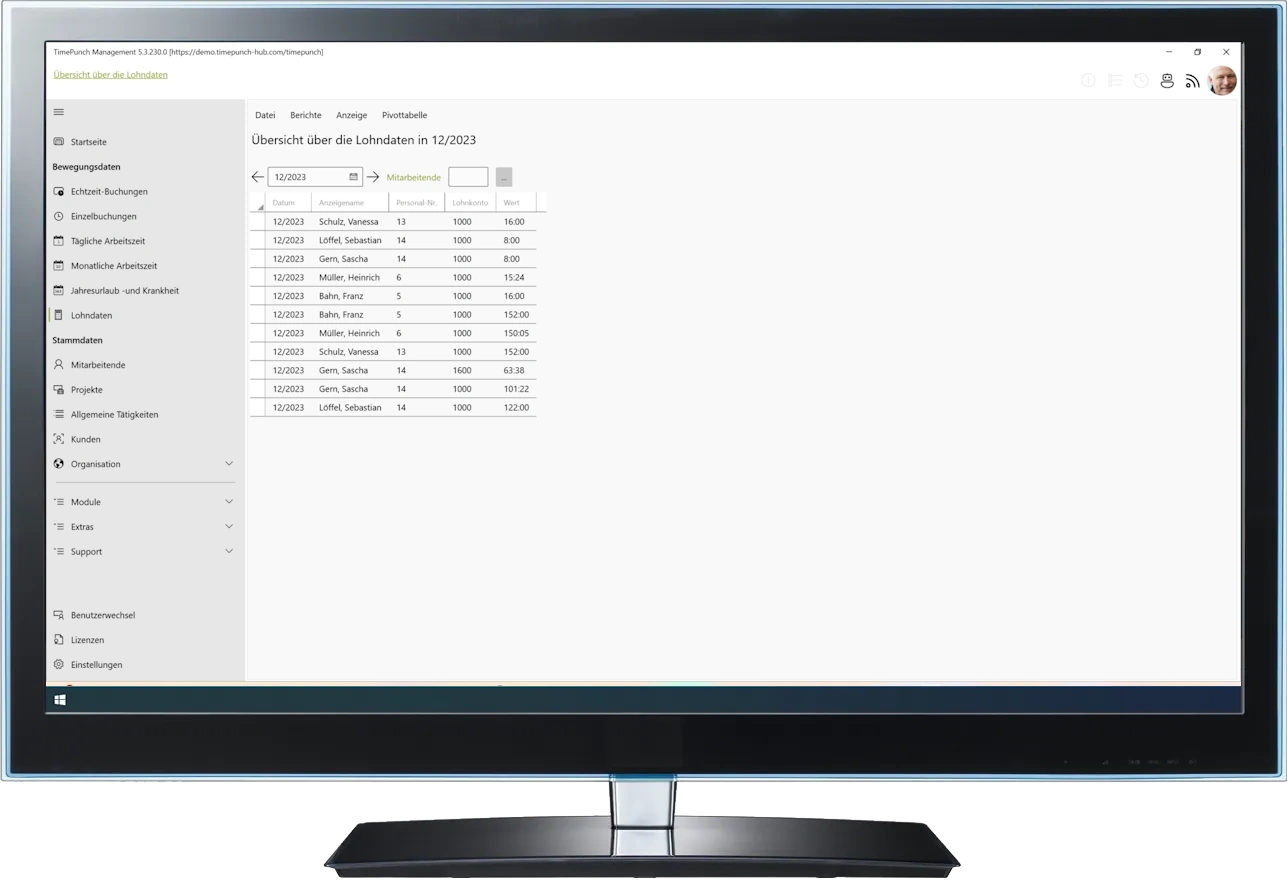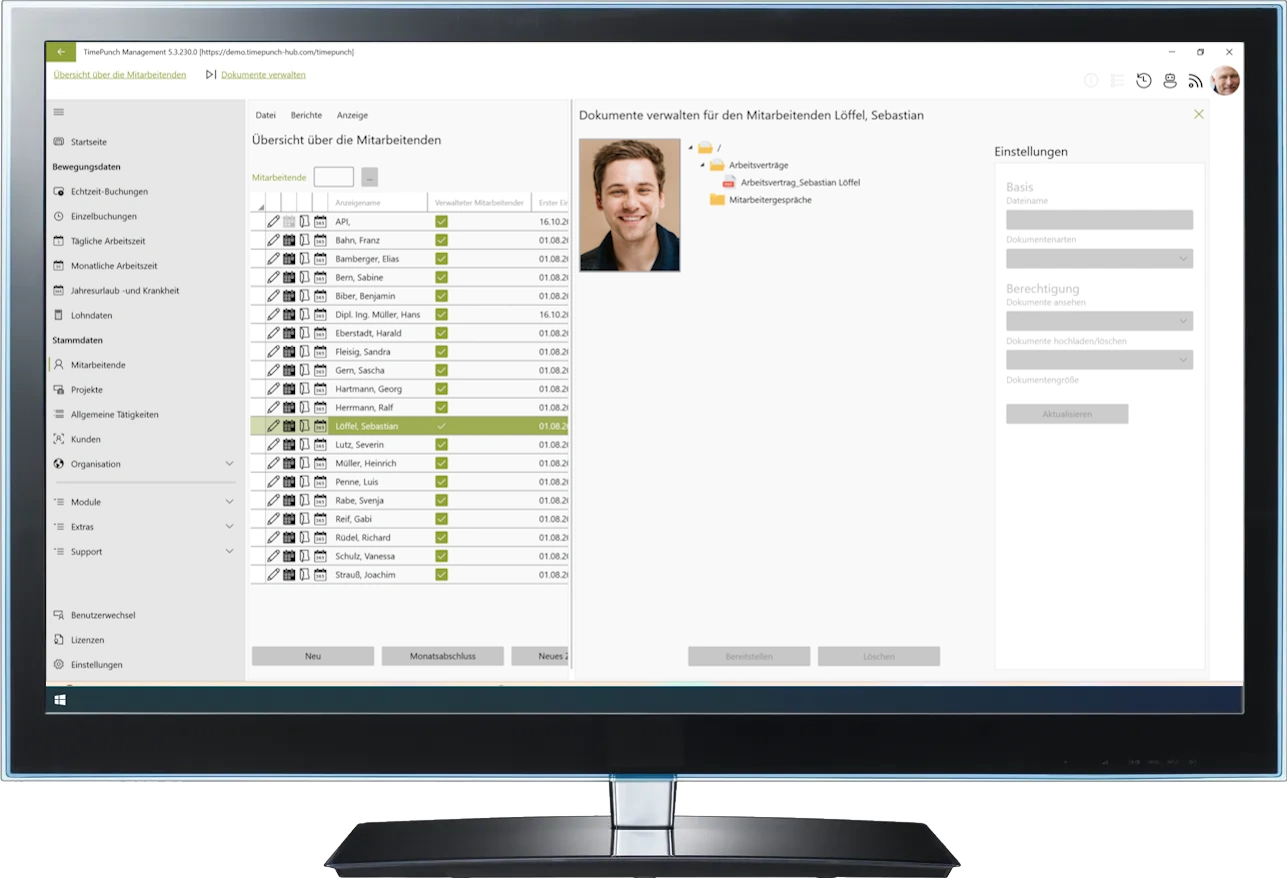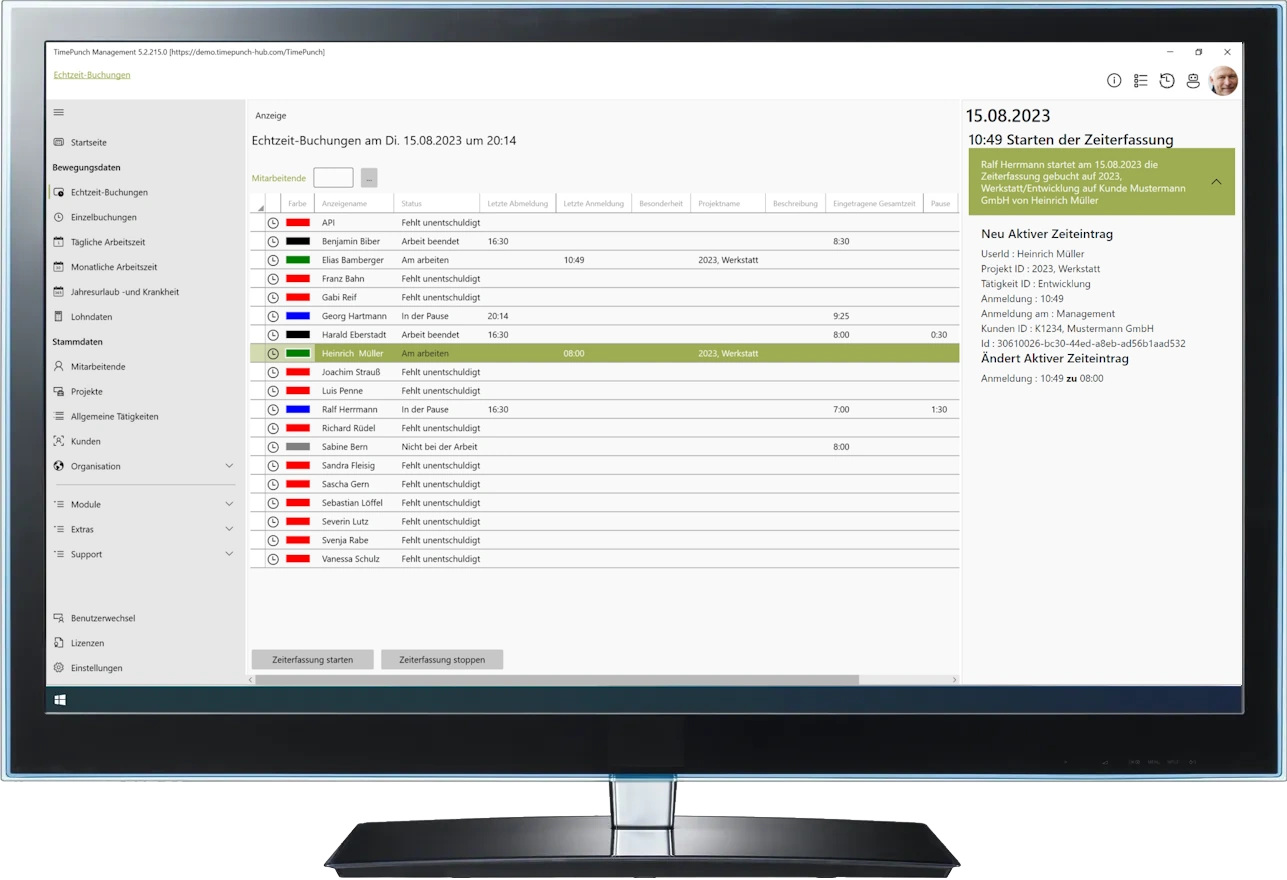Personalzeiterfassung
Arbeitszeit, Gleitzeitkonto, Urlaub, Krankheit und Feiertage
Schlüsselfunktionen
- Erfassen der Arbeitszeiten, inkl. Übernachteinträgen
- Führen von Gleitzeitkonten
- Automatische Berechnung der Überstunden
- Urlaub, Resturlaub und Sonderurlaub
- Krankheit mit und ohne Entgeltfortzahlung
- Feiertagsberechnung in allen Bundesländern - Europaweit
TimePunch deckt alle Funktionen der modernen Personalzeiterfassung ab. Dazu gehört die Erfassung der reinen Kommen -und Gehen Zeit, inklusive der die Möglichkeit auch Übernachteinträge zu buchen, sowie das Führen von Gleitzeitkonten mit automatischer Berechnung der Überstunden und Fehlzeiten.
So können für Mitarbeitende Soll-Arbeitszeitmodelle hinterlegt werden, aus denen sich dann der Überstundensaldo automatisch berechnet. Selbstverständlich können Überstunden auch dazu verwendet werden, um diese als Freizeitausgleich abzufeiern oder den Mitarbeitenden auszuzahlen.
Ebenfalls integriert ist eine Urlaubsverwaltung, inkl. Urlaubsübertrag ins nächste Jahr und der direkten Anzeige des Resturlaubs für Angestellte am Terminal oder in der PC-Software. Dazu gehört auch die Möglichkeit Sonderurlaube oder Sabbaticals zu verwalten.
Kranktage der Mitarbeiter*innen können in TimePunch hinterlegt und verwaltet werden. Das gilt auch für eine mögliche Corona Quarantäne. Für den Lohndatenexport kann zwischen Krankheit mit Entgeltfortzahlung durch den Arbeitgeber und ohne Entgeltfortzahlung bei Krankheitsdauer über 6 Wochen unterschieden werden.
Feiertage sind pro Bundesland für Deutschland, Schweiz und Österreich bereits hinterlegt und müssen nicht manuell aktualisiert werden. Bewegliche Feiertage werden von der Zeiterfassung automatisch berechnet.
Lohn -und Gehaltsdatenexport
Schlüsselfunktionen
- Lohn -und Gehaltsdatenexport
- Unterscheidung Lohn- und Gehaltsemfänger
- Export von Ausfallzeiten
- Export von zuschlagsrelevanten Zeiten
Wichtig
- Sachbearbeiter*innen benötigen eine TimePunch Management Lizenz
Über den integrierten Lohn -und Gehaltsdatenexport können die verbuchten Arbeitszeiten direkt an das verwendete Lohn -und Gehaltsprogramm weitergegeben werden. Hierzu werden aus TimePunch heraus die Lohndaten im jeweiligen Zielformat in einer Exportdatei gespeichert.
TimePunch bietet integriert die Möglichkeit zum Export nach DATEV Lodas, DATEV Lohn und Gehalt, Lexware Lohn und Gehalt, SBS Lohn Plus und GFP-Impuls an.
Neben den Arbeitszeiten, können auch Ausfallzeiten, wie Krankheit, Urlaub und Feiertage mit der Sollzeit oder der Durchschnittsberechnung nach 13 Wochen oder 6 Monaten übergeben werden. Nacht-, Wochenend-, Feiertag und Überstundenzuschläge werden dabei auf Wunsch, ebenso berücksichtigt. Selbstverständlich auch mit Priorisierungsmöglichkeiten.
Sofern ein anders Lohnprogramm, als die bereits integrierten Systeme verwendet wird, kann der Export mit überschaubarem Aufwand angepasst werden.
Digitale Personalakte
Schlüsselfunktionen
- Mitarbeiterstammdaten
- Dokumentenablage
- Mitarbeiterselbstauskunft
- Zeitgesteuerte Entlassung -und Einstellung
Wichtig
- Anwender*innen benötigen eine Digital-Lizenz, um die Digitale Personalakte, inkl. der Selbstauskunft nutzen zu können.
TimePunch verfügt über eine digitale Personalakte für jeden Mitarbeitenden. Damit können alle mitarbeiterbezogenen Stammdaten in der Zeiterfassung TimePunch hinterlegt werden. Dies betrifft allgemeine Daten, wie die E-Mail-Adresse und die Team -oder Abteilungszugehörigkeit, aber auch persönliche Daten, wie die postalische Anschrift, Gehaltsinformationen oder Kontodaten. Alles zentral an einem Punkt – in TimePunch.
Zudem kann TimePunch auch als Dokumentenablage verwendet werden. So können Arbeitsverträge, Mitarbeitergespräche oder auch Gehaltsabrechnungen in TimePunch hinterlegt und zentral für die Mitarbeitenden zugänglich gemacht werden. Innerhalb der Dokumentenablage können Zugriffsrechte für bestimmte Order oder Dokumente vergeben werden. Damit wird verhindert, dass Angestellte Dokumente einsehen können, die nicht für sie bestimmt sind.
Das Einsehen der Dokumente geschieht über das Modul Selbstauskunft. Dort können Mitarbeiter*innen auf die für sie freigegebenen Dokumente zugreifen. Wird ein neues Dokument hochgeladen, welches für Mitarbeitende einsehbar ist, dann wird automatisch eine Mail an die betroffene Person mit der Info gesendet, dass neue Dokumente zur Verfügung stehen.
Nicht zu vergessen sind die zeitgesteuerten Entlassungen -und Einstellungen. Dabei kann bei Mitarbeitenden bereits vorab das Kündigungsdatum oder das Einstellungsdatum hinterlegt werden. Ist dieses Datum überschritten, werden dem/der Mitarbeiter*in die Zugriffsrechte entzogen oder bei einer Einstellung auch gegeben. Damit werden Überraschungen beim Start und Ende des Beschäftigungsverhältnisses vermieden.
Protokollierung und Audit
Schlüsselfunktionen
- Kernzeitverletzungen
- Anpassungen von Zeiteinträgen
- Monatsabschlüsse
- Verletzung von Rahmenzeiten
- Fehlbuchungen
Transparenz ist immer wichtig, vor allem bei einer Zeiterfassung. Daher werden viele Vorgänge in TimePunch protokolliert und auf Wunsch an verschiedene Zuständigkeiten gesendet.
So ist es in TimePunch möglich, pro Arbeitszeitmodell auch Kernzeiten zu hinterlegen. Kommen Mitarbeitende zu spät oder vergessen zu buchen, dann können die Mitarbeitenden selbst oder aber auch deren Vorgesetzte darüber informiert werden.
Das gleiche gilt auch beim Anpassen oder Ändern von Zeiteinträgen. Auch hier können die Betroffenen selbst (wenn die Änderung vom Personalbüro durchgeführt wurde) oder auch die Vorgesetzten (wenn die Mitarbeiter*innen selbst über Änderungsrechte verfügen) per Mail informiert werden.
So auch bei durchgeführten Monatsabschlüssen oder Fehlbuchungen, die auftreten können, wenn Mitarbeitende beispielsweise vergessen abzustempeln oder doppelte Stempelungen durchführen. Auch hier wird das Personalbüro automatisch informiert.
Zu guter Letzt gilt das auch für Verletzungen des Rahmenzeitmodells. Wenn beispielsweise Mitarbeitende nicht zur Pause stempeln oder zu früh zur Arbeit kommen, werden diese Punkte protokolliert und an die entsprechende hinterlegte Stelle gemeldet.
Funktionsübersicht
Hier noch einmal alles aufgelistet
| Arbeitszeit, Gleitzeitkonto, Urlaub, Krankheit und Feiertage | |
|---|---|
| Erfassung der Arbeitszeiten | Buchen von Kommen/Gehen, sowie Pause und Dienstgang |
| Führen von Gleitzeitkonten | Führen von Gleitzeitkonten, mit der Möglichkeit Überstunden abzufeiern oder sich auszahlen zu lassen. |
| Berechnung der Überstunden | Automatische Berechnung der Überstunden, auch bei Angestellten im Niedriglohnsektor, Teilzeitverträgen und Lohnempfängern |
| Urlaub, Resturlaub und Sonderurlaub | Verwalten von Urlaubskonten, mit Urlaubsübertag und automatischem Urlaubsverfall, sowie Resturlaub und Sonderurlaub. |
| Krankheit mit und ohne Entgeltfortzahlung | Möglichkeit zum Eintragen von Krankheit mit und ohne Entgeltfortzahlung, sowie Corona Quarantäne. |
| Feiertagsberechnung mit allen Bundesländern | Automatische Berücksichtigung von spezifischen Feiertagen im DACH-Bereich pro Land und Bundesland. |
| Individuelle Feiertag | In TimePunch besteht zudem die Möglichkeit auch individuelle Feiertage (z.B. Fasching oder einen halben Tag an Sylvester) zu hinterlegen. |
| Lohn -und Gehaltsdatenexport | |
|---|---|
| Lohn -und Gehaltsdatenexport | Export nach DATEV Lodas, DATEV Lohn und Gehalt, Lexware Lohn und Gehalt, SBS Lohn Plus und GFP-Impuls |
| Unterscheidung Lohn- und Gehaltsemfänger | Export der vergüteten Arbeitszeit bei Lohnempfängern, Export des Bruttolohns bei Gehaltsempfängern |
| Export von Ausfallzeiten | Export der Ausfallzeit, optional mit Durchschnittsberechnung nach 13 Wochen oder 6 Monaten |
| Export von zuschlagsrelevanten Zeiten | Export von Zuschlägen, wie Nachtzuschlag, Wochenendzuschlag, Feiertagszuschlag und Überstundenzuschlag pro Tag und/oder Monat |
| Digitale Personalakte | |
|---|---|
| Mitarbeiterstammdaten | In den Mitarbeiterstammdaten können alle wichtigen Informationen rund um Mitarbeitende hinterlegt werden. |
| Dokumentenablage | Die Dokumentenablage ermöglicht es Arbeitsverträge, Mitarbeitergespräche oder Gehaltsabrechnungen zentral und sicher für Mitarbeitende zu hinterlegen. |
| Mitarbeiterselbstauskunft | Die Selbstauskunft ermöglicht es Mitarbeitenden auf die eigene Personalakte digital über den Browser zuzugreifen. |
| Zeitgesteuerte Entlassung -und Einstellung | Als zentrale Steuermöglichkeit dient die zeitgesteuerte Entlassung -und Einstellung von Mitarbeiter*innen dazu, eine bessere Planbarkeit und Kontrolle über Mitarbeitende zu erhalten. |
| Protokollierung und Audit | |
|---|---|
| Kernzeitverletzungen | Meldung wenn die Kernarbeitszeit, d.h. spätestmöglicher Arbeitsbeginn und frühestmögliches Arbeitsende nicht eingehalten werden. |
| Anpassung von Zeiteinträgen | Meldung, wenn Zeiteinträge durch Mitarbeitende selbst (mit entsprechenden Änderungsrechten) oder vom Vorgesetzten oder im Personalbüro geändert werden. |
| Monatsabschlüsse | Meldung, wenn Monatsabschlüsse durchgeführt werden. |
| Verletzung von Rahmenzeiten | Meldung, wenn Mitarbeitende zu früh zur Arbeit kommen, oder Pausenzeiten nicht eingehalten werden. |
| Fehlbuchungen | Meldung, wenn Mitarbeitende sich vergessen abzumelden, oder doppelte Buchungen durchführen. |



